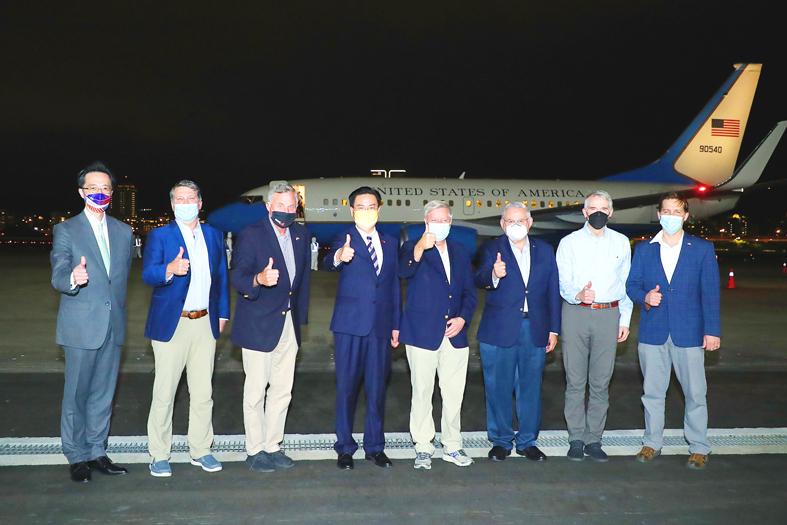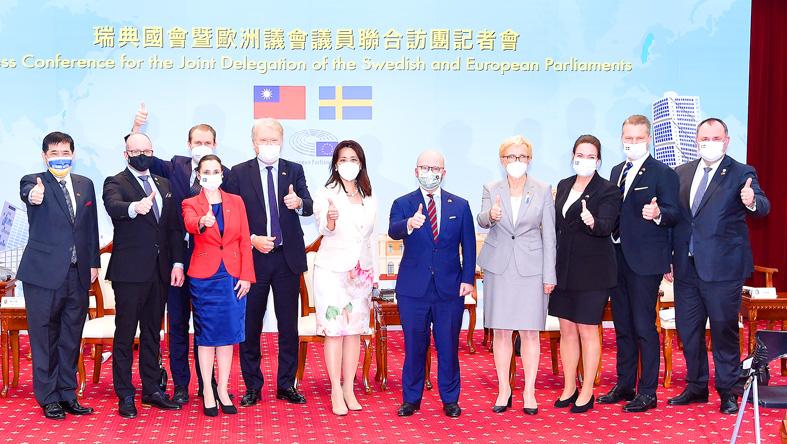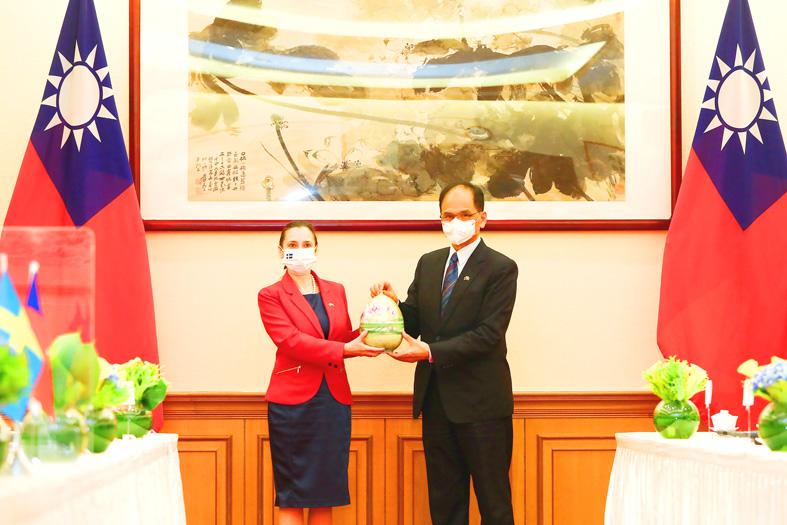A delegation of six high-ranking US lawmakers yesterday arrived in Taipei for a one-day visit as part of their Asia tour.
US Senator Lindsey Graham, who is ranking member of the US Senate Budget Committee, is leading the delegation, which also includes US Senate Foreign Relations Committee Chairman Robert Menendez, a Democrat, and Republican senators Richard Burr, Ben Sasse and Rob Portman.
Republican Representative Ronny Jackson is the only US House of Representatives member on the visit.

Photo courtesy of the Ministry of Foreign Affairs
Burr is ranking member of the Senate Health, Education, Labor and Pensions Committee, while Portman is ranking member of the Senate Homeland Security Committee.
The group touched down at 7:40pm at Taipei International Airport (Songshan airport) on a US military aircraft, where they were received by Minister of Foreign Affairs Joseph Wu (吳釗燮), the Ministry of Foreign Affairs said in a news release welcoming the visitors.
Before departing today, they are to meet with President Tsai Ing-wen (蔡英文) and Minister of National Defense Chiu Kuo-cheng (邱國正) to “exchange views on various important issues related to Taiwan-US relations,” the ministry said.

Photo: Liao Chen-huei, Taipei Times
They are also to attend a banquet organized by Wu, it said.
This is the first US congressional delegation to visit Taiwan this year, after a trip reportedly planned by House Speaker Nancy Pelosi this week was canceled after she tested positive for COVID-19.
The group is on an Asia tour as US lawmakers gradually resume international travel after years of COVID-19 pandemic restrictions.

Photo: CNA
Graham took the initiative to include Taiwan on the itinerary to “demonstrate the high regard and firm support US lawmakers from both parties have for Taiwan,” the ministry said.
Also yesterday, a visiting Swedish and European parliamentary delegation held a news conference in Taipei before their scheduled departure in the evening.
The representatives emphasized their unified support for Taiwan, despite representing a vast coalition of parties.
The visit was to send a signal of support from Europe to Taiwan, and to make sure “such signal is heard all across the Taiwan Strait,” Member of the European Parliament Charlie Weimers said.
“We want to let Beijing know that, over in Europe, we know Taiwan and care for Taiwan,” Weimers said.
Swedish Parliament Deputy Speaker Kerstin Lundgren said she was warned by Beijing not to visit, but added that the message only proved the need to support Taiwan.
Lundgren said that her chamber would soon debate changing the name of Sweden’s representation in Taiwan in an effort to “scale up” the office.
Currently named the “Swedish Trade and Invest Council,” the parliamentarians next week would debate renaming the office “House of Sweden,” which is also the name for the country’s embassy in Washington.
The change would show that the entity promotes other bilateral links besides just business, Lundgren said.
Legislative Speaker You Si-kun (游錫堃) also met with the Swedish and European delegation earlier in the day to thank them for their support.
Additional reporting by CNA

INVESTIGATION: The case is the latest instance of a DPP figure being implicated in an espionage network accused of allegedly leaking information to Chinese intelligence Democratic Progressive Party (DPP) member Ho Jen-chieh (何仁傑) was detained and held incommunicado yesterday on suspicion of spying for China during his tenure as assistant to then-minister of foreign affairs Joseph Wu (吳釗燮). The Taipei District Prosecutors’ Office said Ho was implicated during its investigation into alleged spying activities by former Presidential Office consultant Wu Shang-yu (吳尚雨). Prosecutors said there is reason to believe Ho breached the National Security Act (國家安全法) by leaking classified Ministry of Foreign Affairs information to Chinese intelligence. Following interrogation, prosecutors petitioned the Taipei District Court to detain Ho, citing concerns over potential collusion or tampering of evidence. The

‘FORM OF PROTEST’: The German Institute Taipei said it was ‘shocked’ to see Nazi symbolism used in connection with political aims as it condemned the incident Sung Chien-liang (宋建樑), who led efforts to recall Democratic Progressive Party (DPP) Legislator Lee Kun-cheng (李坤城), was released on bail of NT$80,000 yesterday amid an outcry over a Nazi armband he wore to questioning the night before. Sung arrived at the New Taipei City District Prosecutors’ Office for questioning in a recall petition forgery case on Tuesday night wearing a red armband bearing a swastika, carrying a copy of Adolf Hitler’s Mein Kampf and giving a Nazi salute. Sung left the building at 1:15am without the armband and apparently covering the book with a coat. This is a serious international scandal and Chinese

Seventy percent of middle and elementary schools now conduct English classes entirely in English, the Ministry of Education said, as it encourages schools nationwide to adopt this practice Minister of Education (MOE) Cheng Ying-yao (鄭英耀) is scheduled to present a report on the government’s bilingual education policy to the Legislative Yuan’s Education and Culture Committee today. The report would outline strategies aimed at expanding access to education, reducing regional disparities and improving talent cultivation. Implementation of bilingual education policies has varied across local governments, occasionally drawing public criticism. For example, some schools have required teachers of non-English subjects to pass English proficiency

TRADE: The premier pledged safeguards on ‘Made in Taiwan’ labeling, anti-dumping measures and stricter export controls to strengthen its position in trade talks Products labeled “made in Taiwan” must be genuinely made in Taiwan, Premier Cho Jung-tai (卓榮泰) said yesterday, vowing to enforce strict safeguards against “origin laundering” and initiate anti-dumping investigations to prevent China dumping its products in Taiwan. Cho made the remarks in a discussion session with representatives from industries in Kaohsiung. In response to the US government’s recent announcement of “reciprocal” tariffs on its trading partners, President William Lai (賴清德) and Cho last week began a series of consultations with industry leaders nationwide to gather feedback and address concerns. Taiwanese and US officials held a videoconference on Friday evening to discuss the